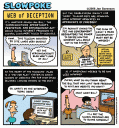Net Neutrality is now Red Hot
The Federal Trade Commission (FTC) has decided to abandon net neutrality and allow telecoms companies to charge websites for access.
The FTC said in a report that, despite popular support for net neutrality, it was minded to let the market sort out the issue.
This means that the organisation will not stand in the way of companies using differential pricing to make sure that some websites can be viewed more quickly than others. The report also counsels against net neutrality legislation.
———————–

– Most of the news we get is filtered. A small list of big corporate entities own the majority of America’s major news outlets. We’re talking radio, television and newspapers here. Sadly, much of the American public is unaware that their news comes predigested for them by corporations which have vested interest in spinning the news to benefit themselves.
– And why shouldn’t they? Corporations are, after all, entities created and designed to seek profit for themselves and their stockholders above all else. So, for example, if academic papers began to appear discussing how corporate America is picking and choosing the news they deliver to you to benefit themselves, do you think that this same big media would report the story to us as news so we can be better informed citizens?
– People with lots of money and vested interests are always trying to spin the news to influence you and manipulate your perceptions.
– Look at what the paint industry did all through the 40’s and 50’s trying to convince the American public that the lead in their paints wasn’t harmful to people.
– Look at all the lies the tobacco industry broadcast for decades claiming that cigarette smoke wasn’t harmful to people.
– Look at what Exxon and other oil and coal companies are doing today trying to sow confusion and doubt in the public’s mind as to the causes of global climate change.
– Make no mistake about it. Big corporations have big vested interests and they will do whatever they need to to protect their markets and their profits.
– And the news media is extremely important in all of this because the media is the best tool to leverage to public’s perceptions and beliefs. Everyone who’s got big money on the table has realized how central controlling the news media is.
– Now, flip the situation over and look at how the Internet and all of the alternative news that gets reported there looks to the big corporate interests. Exxon would like to convince us that there is no particular relationship between the amount of greenhouse gases, like carbon dioxide, we generate when using their products and global climate change. Do you think they appreciate the fact that alternative news sources, such as those widely available on the Internet, are diluting their efforts to shape our perceptions and opinions about this important issue? If enough people read these alternative news sources, a political ground swell might well result and laws could get passed that would badly damage Exxon’s bottom line. Wahdayaa think? That they’re happy that Americans have alternative news and are therefore better informed citizens – or are they trying to find ways to lessen the danger to their bottom line that alternative news represents?
– Well folks, that brings us to Net Neutrality and why it’s an issue you should care about very deeply. Advocates of retaining Net Neutrality warn that broadband providers will use their power over the “last mile” to block applications they do not favor, and also to discriminate between content providers (i.e. websites, services, protocols), particularly competitors.
– Now, if you go out and read widely about Net Neutrality, you are going to see a lot of opinions – pro and con. It can be a confusing issue within which you can get lost in all the terminology and arguments.
But, cling to this idea:
– Once big corporate interests get the right to begin to differentially charge us according to what the content is, it will only be a matter of time before new sources which those corporate powers don’t like will find themselves being pushed further and further towards the edge of the Internet stage.
– To those who want to control the information you receive for their own benefit, there is no bigger source of uncontrolled information than the Internet. If they can begin to drive wedges into it, they certainly will. And every time they can drive those wedges a bit further, bettering their position and diminishing their opponent’s – they will.
– It is extremely fortunate for all of us that the Internet came along just about the same time in history that corporate consolidations essentially took the ‘freedom’ out of America’s Free Press.
– I know some of you will have strong doubts as to whether this issue and my concerns about it are overblown. To those of you that have such doubts, I offer you this link. Follow it and read it and if you still doubt, then so be it.
– And to those if you that do believe that Net Neutrality is a burning issue, follow
to a site which has suggestions as to what you can do, right now, to speak your piece on this before freedom of information on the Internet is cut right from under our feet.
—————
– thx to Kevin at The Cryptogon for alerting me to this story about the FTC’s decision.


